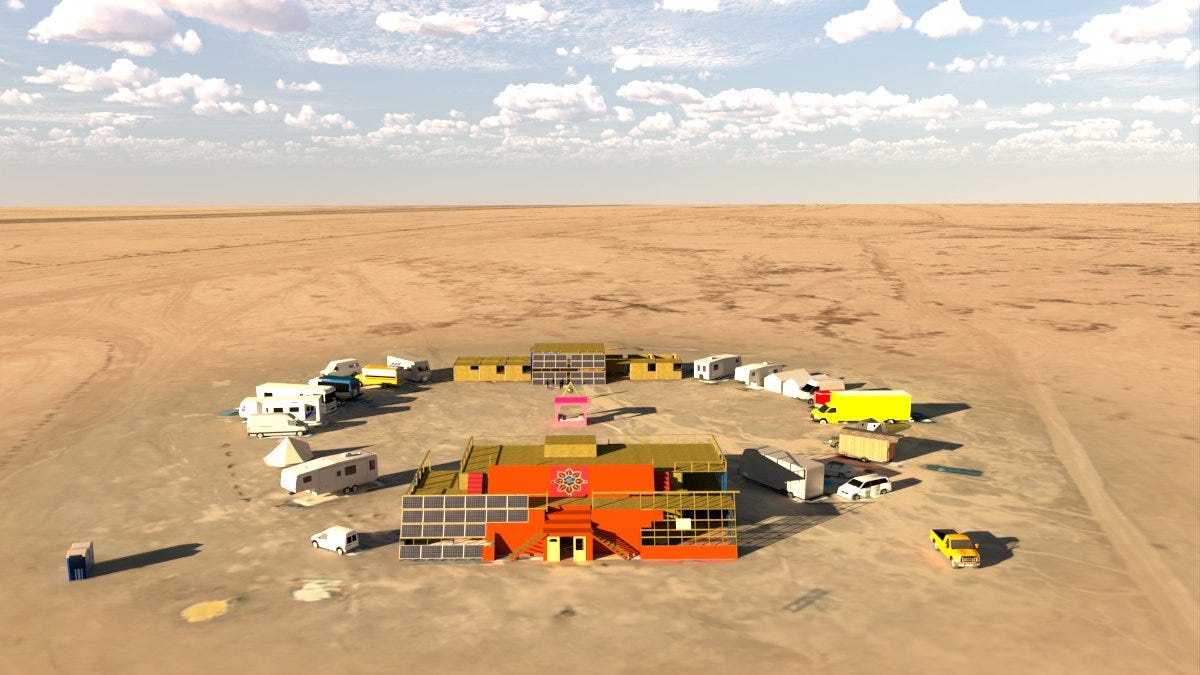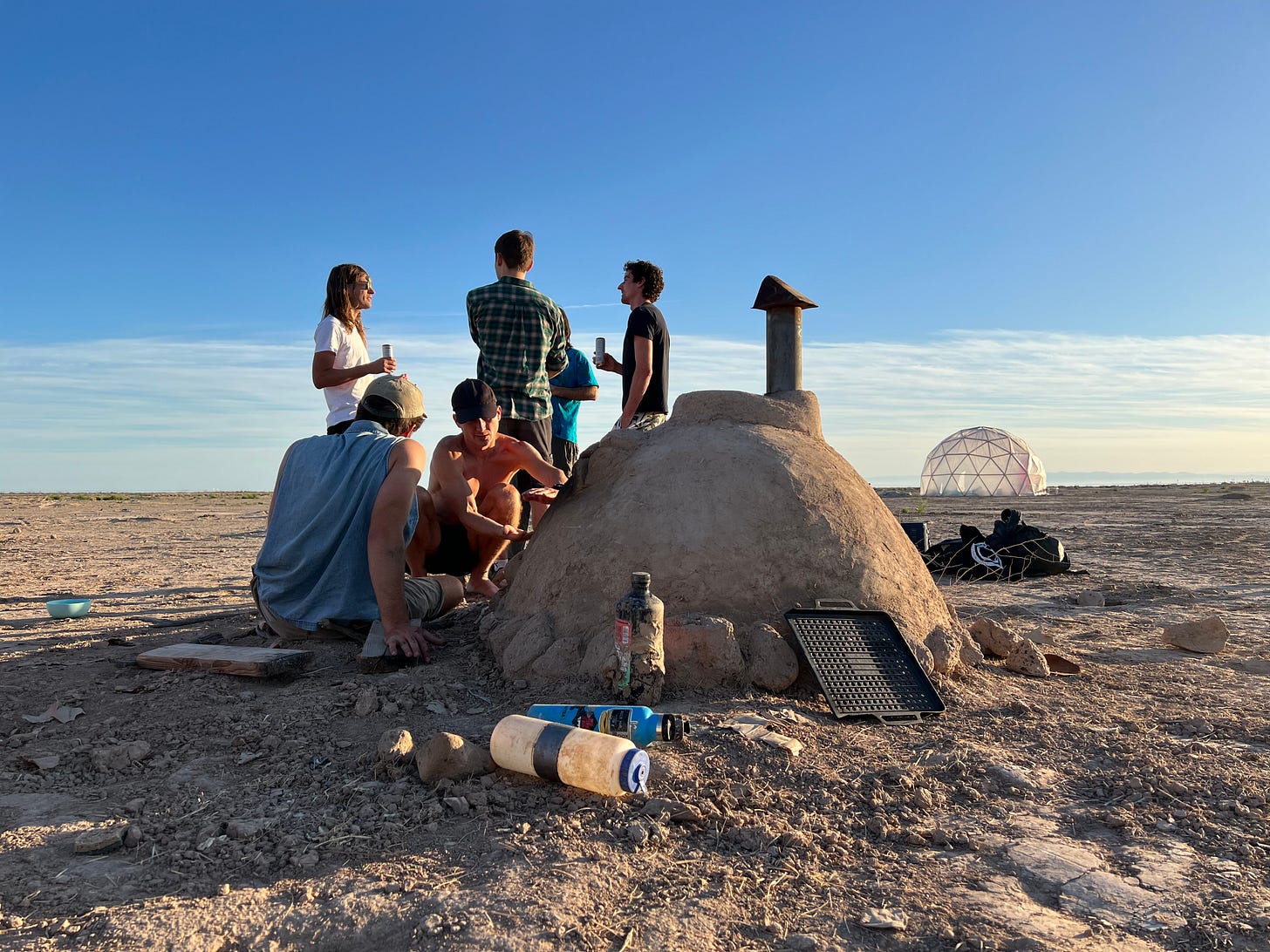On Mars: A Pop-up College in the Desert
when the world is seized by AI overlords and the only things left are desert and large language models, we'll be ready.
This is an article about Mars College, written by Amy Brown Carver.
A RITE OF PASSAGE
What constitutes an adult? Many cultures make a point of clarifying the transition from youth to adulthood. These rituals or rites frequently include challenges of strength or survival, the passing down of skills and values, and time for personal reflection and internal development.
For example, the Aboriginal people have the Walkabout where a youth transitions to adulthood by surviving on their own in the wilderness. (And everything in Australia can kill you.) This can last for months up to a few years. They also visit sacred sites and learn about the Aboriginal understanding of the world (called Dreamtime). They are to reflect on their life thus far and on the community responsibilities that await them when they return. The Irish traditionally practice “booley,” when teenagers go unsupervised to move and tend to the sheep in the summer pastures. This semi-independent communal living was a chance for the young people to bond and share the responsibilities of care for the herd. The Amish have rumspringa. Mormons go on their two-year mission. People in Brazil wear gloves full of bullet ants. The list goes on.
In main-stream Western society, attending University has become this coming-of-age rite of passage, a two- to ten-year process of giving youths all the skills and abilities they will need as adults.
It’s many students’ first time living away from their nuclear family for the first time. By the time they are done, ideally, they’ve built the skills to peacefully live with other people.
They’ve chosen a subject that’s interesting to them and have enlarged their inner life and also received knowledge/culture from the people who have gone before them in their particular discipline. (Ideally.)
And they’ve developed a toolset that will allow them to provide for themself financially in the future. (Ideally!)
Bang presto: an adult!
Whether or not universities actually deliver upon the implicit promise of turning young people into adults able to fend for themselves and participate meaningfully in a larger community is a separate question.
But common ingredients in the recipe for producing adults seem to be:
Leaving home
Developing survival skills
Passing down of culture
Personal growth
ENTER: MARS COLLEGE
“Mars college is…”
I liked to eavesdrop when one of my fellow Martians was asked, “So what is Mars?” It’s a tough question to answer. Mars is a three-month educational residency (maybe?). It’s an art and tech incubator with a concentration on AI. It’s a January-March miniature Burning Man. It’s a pop-up college in the desert.
At the beginning of term, Martians build a palette rack structure which serves as the main hub for campus. This year it included a community kitchen, classrooms, a cinema, a dojo for Thai bodyworks sessions, a unicycle repair workshop, a sunroom, and a rooftop for yoga. Martians live in a mixture of RVs, tents, tricked-out vans, busses, and box trucks; and some people sleep in their cars.
Solar panels provide power. Water is hauled in from a nearby town in plastic cubes. Porta potties serve as bathrooms. Propane-powered camping stoves are used for cooking. The nearest grocery store is a 40-minute drive away.
At the end of term, the whole thing is torn down.
So what is Mars College, really? Is it a college – spiritually, if not by accreditation?
LEAVING HOME
Most Martians live out in the desert (A.K.A. “Mars”), or in the nearby town of Bombay Beach, for just three months out of the year. This past year (2024), people came from Portland, Colorado, Los Angeles, France (a lot of people from France), Chile, Berlin, New Jersey, Sweden, Brazil – plus more. Several people arrived with little more than a plane ticket, a cell phone, and a backpack.
Mars is expansive. In one direction, you can see the glittering reflection of the sun off the Salton Sea, in another freight trains chugging by, in another only cracked earth and dry brush. It comes to feel like home, but you certainly have to leave home to get there.
DEVELOPING SURVIVAL SKILLS
The desert is not the most obvious place to set up a college. The windstorms get so bad that all activity regularly reduces to a halt. Dust gets into everything: eyes, ears, lungs, electronics. This January, Mars also saw record-breaking rains, making the campus impassable by vehicle for several days. The only way to get in and out was to walk the mile to Bombay Beach, sinking up to your shins in mud.
Why do it in the desert at all? Wouldn’t it be easier to learn things and work on projects with the advantages of drywall and running water? Why erect a whole campus every year and then just turn around and tear it down?
There probably is a certain amount of imagining a post-apocalyptic future in which pallet racks and solar panels are our only means of survival, and we need to prepare to be able to generate our AI bots under those conditions. And power tools and fire pits and community cooking schedules feel refreshing when the actual survival skills for modern life increasingly include things like taxes, emails, Instagram, Hinge, Uber Eats, and answering texts from your boss. Plus, in the words of the 1911 Boy Scouts Manual: “It is the rare exception, now, when we see a boy that is handy with tools and capable of taking care of himself under all circumstances. But mostly – and this is very important – hey, it’s fun.
It also calls into question what “surviving” looks like. The general prescription for survival may include renting your own apartment, owning a house, owning a bigger house, getting married, having kids, affording your wine club subscription and HBO. But living in a community of Martians for three months – even though you live in a tent and there’s a 56-mile-per-hour wind storm at three in the morning – shows that you can survive and (dare I say it?) thrive on much less.
PASSING DOWN OF CULTURE
There’s no official culture at Mars. No guarantee that one year will look similar to the next. Nobody is telling you how to be. My first few moments at Mars, I was feeling a little flustered and looking for what I should be doing, and a veteran Martian told me to “just experience Mars!” (Okay, but where do I put my stuff?)
There is, instead, Do-ocracy. Do-ocracy means that if you want to do something and it doesn’t look like it’s going to majorly inconvenience anybody else, you just do it. Similarly, instead of complaining about something – because who are you going to complain to? – if you see a problem, you just do something about it.
This applies to how classes and activities are run. There’s no official distinction between teachers and students at Mars. If you want to teach a class, you add it to the google calendar. If you want to attend a class, you just show up. Or don’t. There is no attendance taken, no grades, no guarantee that any particular track will last the whole three months.
This year, the academic tracks at Mars included: physical art, future music, the culinary institute, creative AI with Eden, and yoga. Thunder Talks happened every Wednesday night and were open to the wider community. In the same spirit as the calendar, anyone could give a seven-minute thunder talk on whatever they wanted, you just had to sign up for a slot.
PERSONAL GROWTH
By the end of the three months, many Martians looked back at their time and reflected: “What did I even do at Mars?” Some people completed projects, or half of projects. Most people did some yoga. I learned the proper way to chop an onion. That’s got to count for something.
While Mars may not be particularly great for productivity (busy calendar, windstorms, living on top of one another) it’s useful as a life reset or to shake something loose. At its best, Mars is a place to find your niche, to pursue interests until you find something you’re good at, something you like, and something that is valued and appreciated by the community. (See the post on Solar Sam for a great example of this.)
It’s a place to get a little bit done, learn a little bit about yourself, get a little (or a lot) more connected to people. And when the world is seized by AI overlords and the only things left are desert, large language models, and palette racks, we Martians will be prepared. We’ll be ready. 💪
If you love what we do here, help us spread the words by subscribing & sharing ;)
















